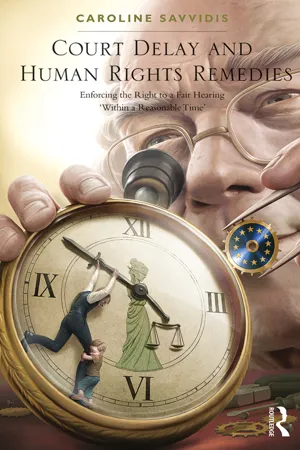
Court Delay and Human Rights Remedies
Enforcing the Right to a Fair Hearing 'Within a Reasonable Time'
Caroline Savvidis
- 128 pages
- English
- ePUB (mobile friendly)
- Available on iOS & Android
Court Delay and Human Rights Remedies
Enforcing the Right to a Fair Hearing 'Within a Reasonable Time'
Caroline Savvidis
About This Book
This book brings legal and academic perspective to the theory and practice surrounding the right to a fair hearing within a reasonable time. This field of rights has been somewhat neglected academically, a fact which jars with the sheer volume of case law budding from this single, simple, fundamental right, bearing testimony to the widespread concern with delay in judicial proceedings which transcends the boundaries of states or legal systems.
The work provides a blueprint for analysing the effectiveness of legal remedies across entire legal systems, as well as in any given individual case. The first part focuses on deriving legal principles from the body of jurisprudence of the European Court of Human Rights in Strasbourg, while the second part contains illustrations of the practical application of such principles.
The content constitutes essential reading for students, academics, lawyers, judges, practitioners and all those who wish to understand the issue of delay in judicial proceedings, and the legal context of available remedies. The author aims to raise awareness about the human rights issues which come into play when delivery of justice is delayed, and to provide both an academic and practical reference.
Frequently asked questions
Information
1
Preliminary Pleas and Fundamental Concepts Relevant to Length-of-Proceedings Cases Brought Before the European Court of Human Rights
Chapter Introduction
- ECHR Article 35(1): Exhaustion of domestic remedies1The Court may only deal with the matter after all domestic remedies have been exhausted, according to the generally recognised rules of international law, and within a period of six months2 from the date on which the final decision was taken.– ECHR Article 35 (admissibility criteria) sub-section 1
- ECHR Article 35(3)3: Inadmissibility ratione personae and loss of victim status as per ECHR Article 344The Court may receive applications from any person, non-governmental organisation or group of individuals claiming to be the victim of a violation by one of the High Contracting Parties of the rights set forth in the Convention or the protocols thereto. The High Contracting Parties undertake not to hinder in any way the effective exercise of this right.– ECHR Article 34 (individual applications)The Court shall declare inadmissible any individual application submitted under Article 34 if it considers that:
- (a) the application is incompatible with the provisions of the Convention or the Protocols thereto, manifestly illfounded, or an abuse of the right of individual application; or
- (b) the applicant has not suffered a significant disadvantage, unless respect for human rights as defined in the Convention and the Protocols thereto requires an examination of the application on the merits and provided that no case may be rejected on this ground which has not been duly considered by a domestic tribunal.
– ECHR Article 35 (admissibility criteria) sub-section 3